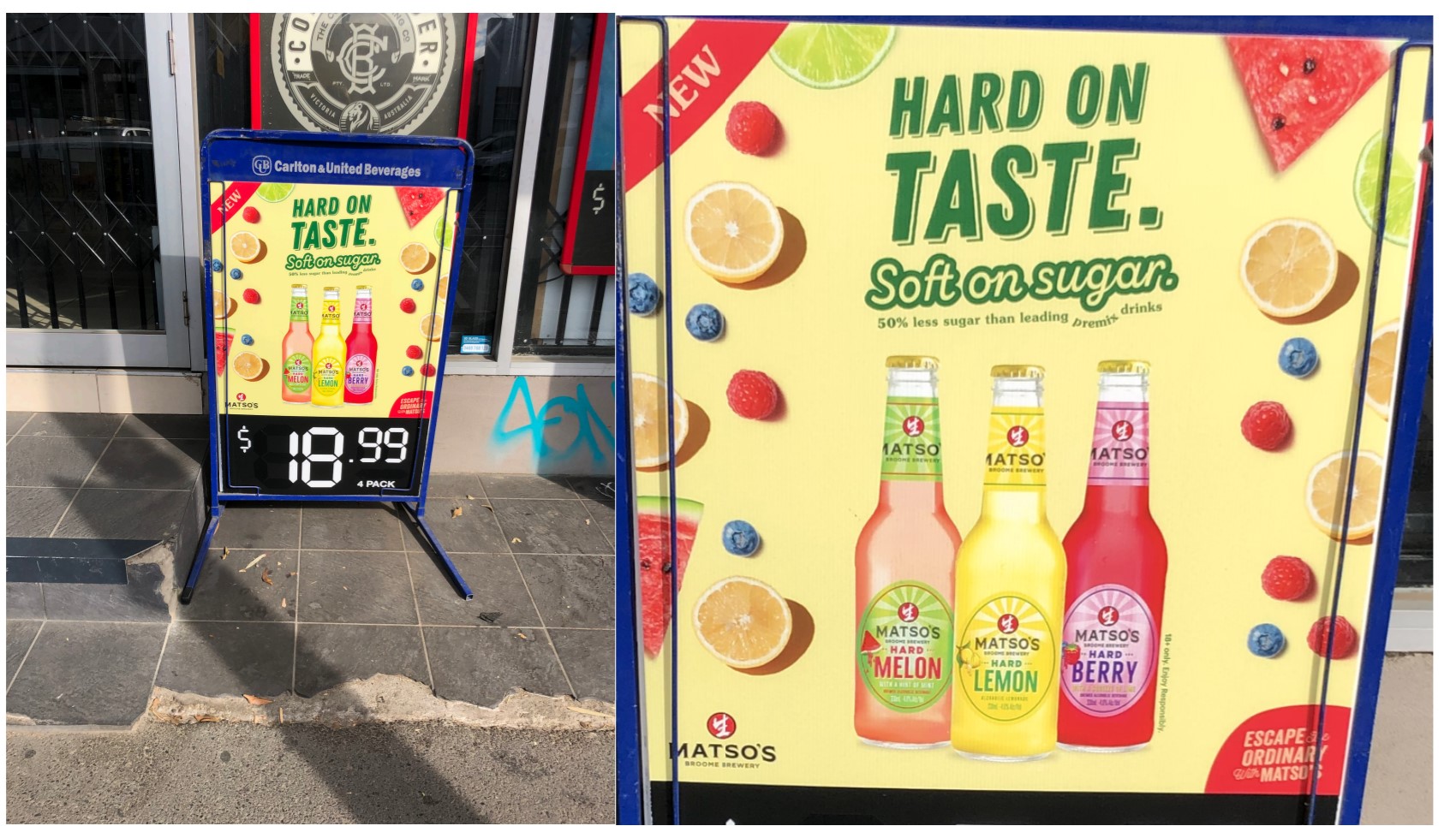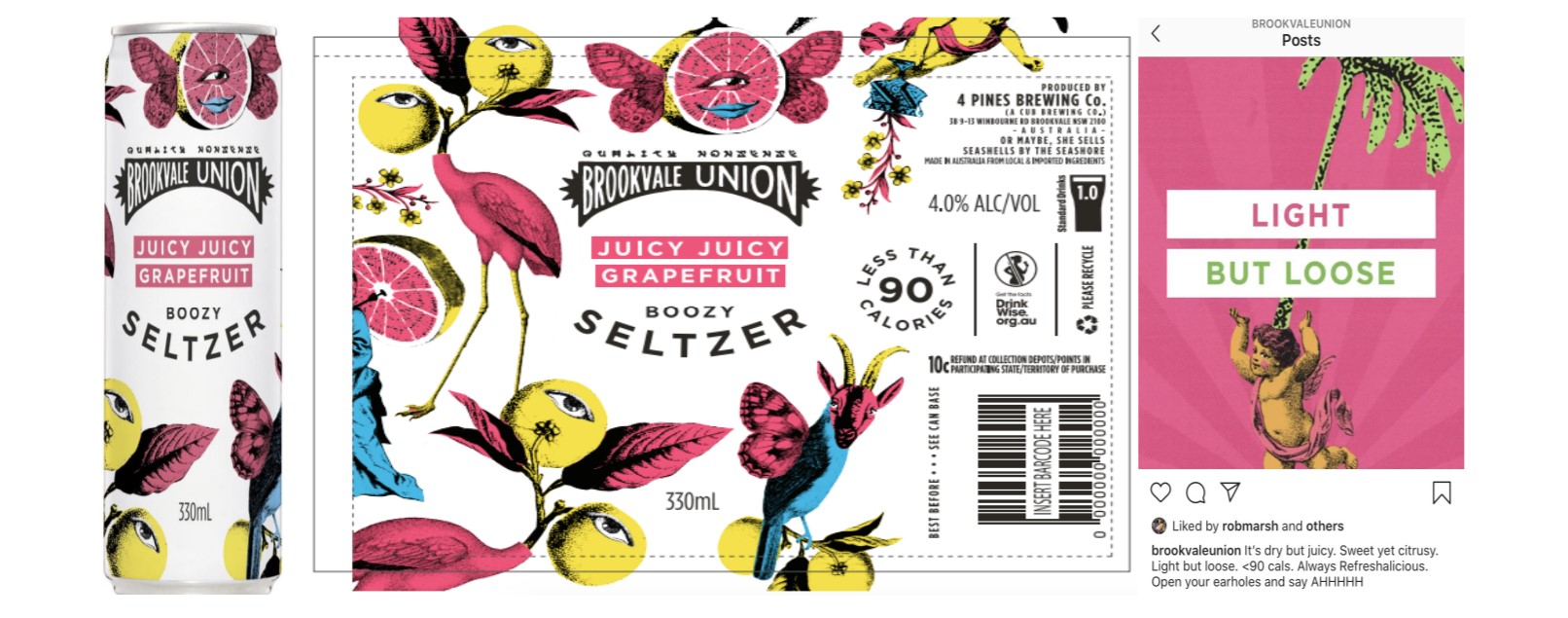
“Near beer” brands face ABAC
An ABAC adjudication panel has ruled on a number of complaints about the marketing of “near beer” products – identified as beverages which are not strictly beer but can be malted or fermented and are considered in the same category.
A complaint against a Matso’s brand was upheld, but the adjudication panel dismissed two relating to Brookvale Union’s Grapefruit Seltzer and Lion-owned Quincy.
The judgements bring up issues commonly associated with beer packaging, including complaints that marketing materials strongly appeal to minors and promote excessive drinking.
Matso’s
Matso’s Brewery, the WA ginger beer company, was on the receiving end of a complaint about its Hard Lemon, Berry and Melon drinks, advertised on a billboard outside Brunswick Cellars in Victoria.

The complainant said that “every time I walk past with my 3 and a half year old [sic] he points these drinks out and wants one and I find it unacceptable for advertising to reach a child in this way”.
The ABAC code stipulates that marketing communications must not have a strong or evident appeal to minors, which includes a ban on imagery, designs or characters that are likely to appeal to minors or that create confusion with a soft drink.
Matso’s said that pre-vetting approval was sought for the packaging of the drinks in question but not the posters themselves. The company said it had not been submitted given that it was a point of sale poster and not designed for outdoor advertising usage.
The company defended its usage of pastels, bright colours and fruit imagery to illustrate the flavour profile and ingredients of the products, and said that the use of the term ‘hard’ denotes alcoholic content.
Meanwhile, references to having less sugar are intended to communicate that the alcoholic products provide “refreshing drinking options for adult consumers who seek to make healthier choices relating to sugar and ingredients,” it said.
Despite its arguments, Matso’s and parent company Good Drinks said that they recognise the merits of the complainant’s argument, in that the poster was intended for use inside a bottleshop or licensed premises, and therefore could understand that there was a risk that minors could engage with it.
The ABAC panel said it acknowledged the reflective response of the company, and the intention for the poster to be used at an appropriate place.
However, the panel said it considers the material as-seen by the complainant, and noted that bright contrasting colours and fruit images could appeal to minors.
It said that the individual labelling of the beverages indicated they were alcoholic but the poster as a whole does not make it clear. Thus, it reasoned, a minor could potentially consider it to be promoting soft drinks.
It upheld the complaint, saying a reasonable person might conclude the poster could appeal to minors and be promoting a soft drink.
Lion’s Quincy
Another complaint to ABAC related to an Instagram advert from Lion for its Quincy Seltzer product, which it launched last year and was one of the first alcoholic seltzers on the Australian market.
The video reportedly showed a number of scenes featuring a woman drinking Quincy. The complainant said it showed a woman who appears to be pregnant, which they said “normalises drinking alcohol in pregnancy which is harmful to the health of the baby”.
The female complainant attempted to argue that the ad targeted pregnant women because she had been Googling ‘Foetal Alcohol Syndrome’ prior to the advert being shown on her social media feed. She did not appear to consider other factors which are considered in advertising algorithms for social media platforms.
Lion responded by saying there were no pregnant women featured in the advert and that it would never target its alcohol advertising towards pregnant women.
The ABAC panel said thatthe woman in the video is not pregnant, and while she is not “unrealistically thin like models often featured in advertising of all kinds, a reasonable person would not believe she appears or is portrayed in a manner which implies she is pregnant”.
It said there was nothing which would lead a reasonable person to conclude that the product is being marketed towards pregnant women, and dismissed the complaint.
Brookvale Union’s Juicy Juicy Grapefruit Boozy Seltzer
Carlton & United Breweries’ Brookvale Union has received a second complaint about its Juicy Juicy Grapefruit Boozy Seltzer.

The complainant took issue with both the packaging and an Instagram post with the words “Light but Loose”.
They said that the use of the word ‘boozy’ constitutes ‘youthful language” which could be attractive to minors, and that the Instagram post also uses the word “loose” which, they said, encourages the consumer to drink large quantities of alcohol “so as to relax and lose their inhibitions”.
CUB responded saying that they have taken “great care to ensure a balance between several aspects of the code”, notably demonstrating the alcohol content of the product and communicating flavour profile without appealing to minors.
It said that the Grapefruit Seltzer had already been the subject of a complaint to ABAC which had subsequently been dismissed.
The company argued that the term ‘boozy’ had already been discussed in relation to the previous complaint, but that the complainant ascribed intentions to the marketing and term ‘loose’ which are not supported.
In context, it said that the term is used to describe the flavour and mouthfeel of the product.
As with the previous complaint, the ABAC panel ruled that the packaging did not breach the code, and said that the Instagram post would not be interpreted by a reasonable person as it has been by the complainant.
The use of the term ‘loose’ is contextualised in the post, the panel said, with no depiction of consumption of the product in any excessive amounts. It dismissed the complaint.



